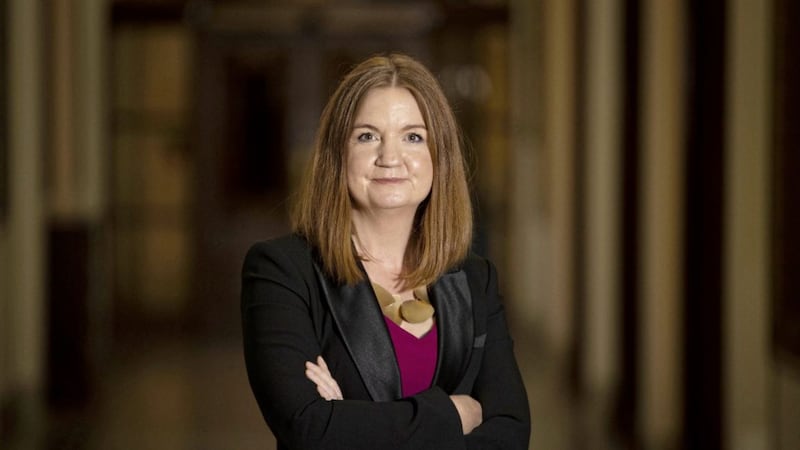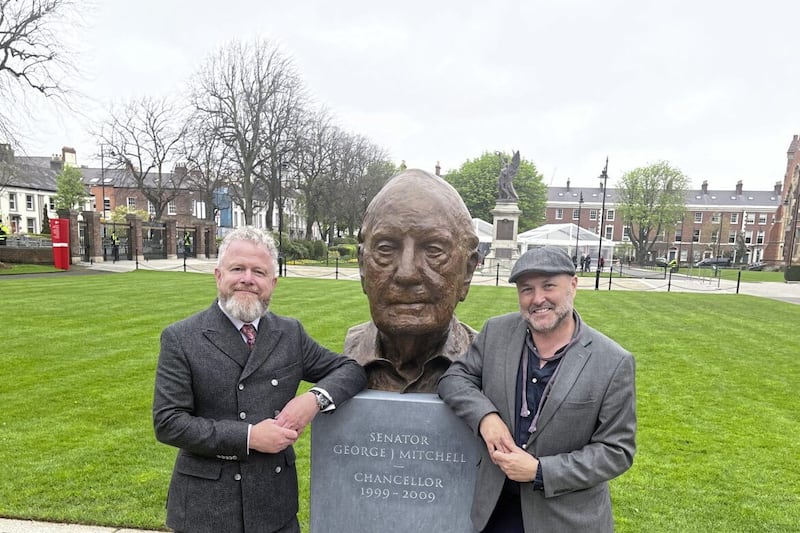SOME hugely important things have happened in the last few weeks (and I don’t mean Tyrone falling over the line at the weekend to win their first Ulster Championship since 2017. I was lucky enough to be there, it was great to be back in Croke park and Meagher’s pub afterwards, of course).
No, I’m talking about are Casement Park passing its final planning hurdle and the appointment of Dr Jayne Brady as the new head of the NI Civil Service.
I’ve written about Casement before, so I’ll not dwell on it again, but last week’s announcement from Nichola Mallon in advance of the Ulster final was a very welcome and timely one, albeit the process to get us to here has been tortuous and way too long. The job now is to get the money agreed and get on with building it. It will be a brilliant new piece of infrastructure for Belfast, an excellent economic generator for west Belfast and a much-needed boost to the GAA in Ulster and in Antrim, in particular.
Jayne’s appointment was met with some surprise in civil service circles. To my knowledge, she is the first non-civil servant to get the job and I’m pretty sure she is also the first woman to get the permanent post (Jenny Pyper steps back from doing the role on an interim basis this month).
Her new job is a massive one, but she comes into the role with an impressive CV and a wealth of goodwill from many people across the public and the private sectors who have had very positive experiences of her over many years.
An engineer by training, Jayne seems to be a thinker and a doer, someone who can do strategy and execution and those skills alongside strong people skills are crucial so that she can bring much-needed efficiencies to the Civil Service here.
Of course, it’s easy to have a pop at the Civil Service.It’s a large and complex organisation with a vast amount of policy areas to cover and limited resources to use. And Jayne’s role, in charge of the 20,000 plus staff across the many departments and agencies, can only hope to have a limited impact, and we can’t expect miracles overnight from Jayne.
One area though, that I think Jayne could make a transformative impact in is planning. Literally, hundreds of millions of pounds of investment and thousands more jobs could be created if we could make our planning system more efficient. For large applications, which are also the ones with the greatest positive economic impacts, the challenge is greatest.
In my experience there are two, possibly three, major obstacles. The first is culture. I have seen far too few examples of enterprising, can-do/will-do culture in the civil service when it comes to large, complex, planning applications.
Senior people in the civil service often know where the delay is going to be but are either unwilling, afraid or culturally unable or untrained to think positively and creatively to overcome the problem. As a result, days become weeks, weeks become months and months become years as major applications gather dust and all the while, quite simple, straightforward thinking and acting could have been applied to get things done.
In my job, I meet plenty of large investors in this place who have come here with Invest NI, Council or other NI Executive related encouragement and with considerable faith that they are coming to a first world jurisdiction where they can expect some certainty about time frames of the government responses to their planning applications.
For the most part - and I’m reflecting on probably 20 years of experience in this area - they literally have a nightmare. It’s embarrassing. A culture change would help a lot and I think Jayne may be of great value in that space.
The second obstacle is structure. While the Department of Infrastructure has overall responsibility for major planning applications, it is dependent on the responses of a vast range of other departments, agencies, councils etc.
The lack of co-ordination of those responses, the variations in timings and quality and what seems like utter disregard for deadlines has to be experienced to be believed at times, though if you are an applicant with tens and sometimes hundreds of millions of investment tied up in the process, I know you would rather not.
Unfortunately, the Department of Infrastructure civil servants have no real locus to insist on improvements and deadlines outside of their own department. In one case I’m aware of, another statutory body (one of our 11 local councils) has just ignored the infrastructure planners for more than two years.
Without the council response, the planning application can’t be processed fully. And while that structure is a problem, I think a culture change would be of big assistance here too; with a can-do attitude, there is no way that council would have been allowed that sort of leeway over such a long period.
At least one of the things needed is a big stick, and in an October 2020 report commissioned by the CBI here and written by Scotland’s former chief planner Jim McKinnon, one of the recommendations was that financial penalties be imposed if timetables are missed.
That would be a welcome development. But I think more is needed to overcome both the structural and cultural obstacles, never mind the last of my three issues, political will.
That one may be the toughest hurdle of all for Jayne but as they say here, no better woman.
So, best wishes to Jayne, let’s get Casement built and let’s hope my old Queen’s teammate and friend, Feargal Logan and the players who had to miss the Ulster final because of Covid are back and raring to go for the semi-final with Kerry, I’m keen for a cracking game in Croke and the before and afters in Meagher’s, of course.
:: Paul McErlean (paul@mcepublicrelations.com) is managing director and founder of MCE Public Relations
:: Next week: Brendan Mulgrew







